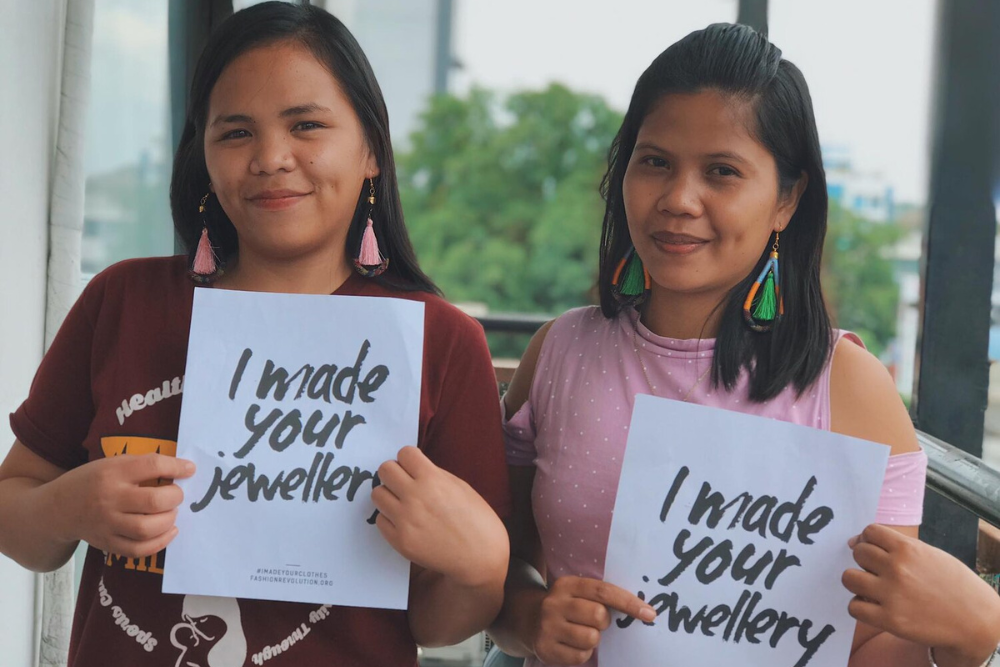Syra and Roxan are artisans from the Tribu Malagos community in Davos, Philippines.
Pag-asa Collective and Reca are two, amazing Kiwi-owned fashion accessory brands created to benefit survivors of human trafficking and former refugees.
A known form of modern day slavery, human trafficking uses force, fraud, or coercion to control victims for the purpose of engaging in commercial sex acts or forced labour. It is commonly regarded as one of the most pressing human rights issues of our time and one of the world’s most lucrative organised crimes, generating more than $150billion a year.
According to Walk Free Foundation’s Global Slavery Index 2016, 25 million victims of forced labour are from East Asia and the Pacific. 71% of modern slavery victims are women and girls. Most victims are trafficked from rural areas with the promise of better work opportunities, only to be stripped of their basic human rights and exploited for years.
To honour World Day Against Trafficking In Persons on July 30th, we spoke with Erica Oliver Poole from Pag-asa Collective and Myint Aung from Reca about how they are helping survivors in Southeast Asia gain independence and hope through meaningful employment.
Erica Oliver Poole, Pag-asa Collective
In 2018, Erica was looking for a way to combine her love for people and need for creativity with a project she could run herself.
She knew she wanted to work specifically with the Philippines since it was her mother’s home country. Plus, she had always felt a special connection to the people and land and wanted to help the communities living there. Growing up, Erica was able to visit the Philippines and experienced the living conditions there – a stark contrast to life in New Zealand.
After much thought and research into existing artisan projects and businesses in the Philippines, Pag-asa Collective was born as a passion project and not-for-profit.
Pag-asa, which means ‘hope’ in Tagalog aims to give hope and provide opportunities for women artisans in the Philippines. They offer a range of beautifully handcrafted accessories, from jewellery to handbags to ties.
What goes into crafting ethical jewellery?
E: Simply, jewellery that has no negative impact on its artisans. They are all paid a fair wage, given safe working conditions, and feel empowered. Low impact on the environment also falls under this. For instance, all our En Route pieces are made using recycled textiles, while ANTHILL places importance on being zero waste and Arete sources all their materials locally.
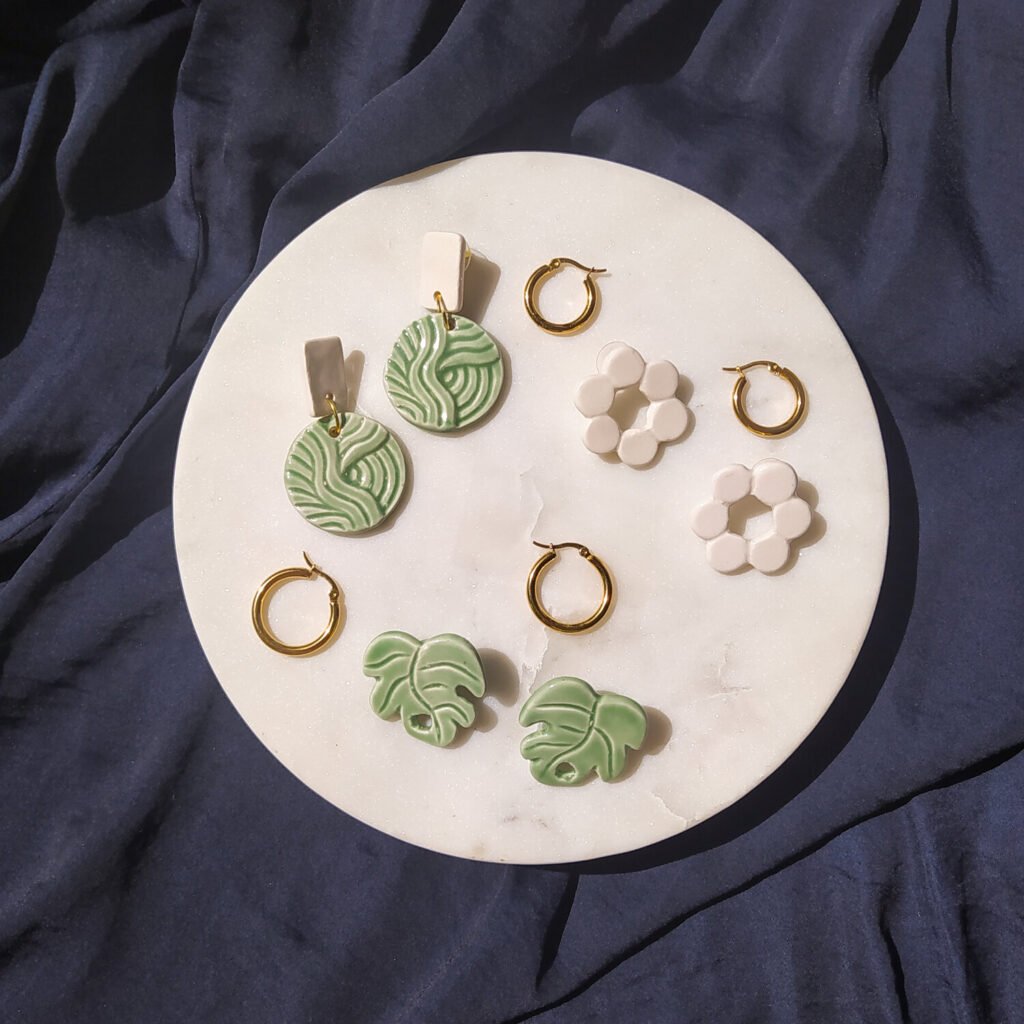
Handmade ceramic earrings by Arete. Image credits: Pag-asa Collective
At fair&good, we love connecting our community to the people who make their products. Could you tell us about your team of artisans?
E: Sure! Each business that we’ve partnered with works with their own group of artisans in different parts of the Philippines.
Arete works primarily with housewives and teen mums in Manila, Cebu & Bacolod.
En Route was founded by Yana, who saw major issues with sex trafficking in her community and wanted to do something about it. She created the social enterprise, Olivia & Diego (now known as En Route Handcrafted) for these women so that they could have a regular source of income. Our current collection from them is made by a community of stay-at-home mothers in Davao.
ANTHILL works with those in rural communities, with the aim of keeping traditional weaving techniques alive and encouraging people to stay within their communities (rather than moving to the big cities for work). They not only employ the artisans, but also teach them financial literacy so they can create their own profitable businesses.
Lastly, Tayo Collective partners with a charity called Wipe Every Tear and employs artisans that have been saved from human trafficking through this charity. Wipe Every Tear provides the artisans with free housing, counselling, and education so they can have a fresh start and break free from the chains of sex trafficking. Tayo Collective gives them a job creating jewellery so they can continue to provide for their families while studying.
Each Tayo piece also comes on a card with the name of the woman that made your jewellery which I think adds such a connection to the piece. That way, you can wear your jewellery with pride knowing the story of hope your purchase is carrying.
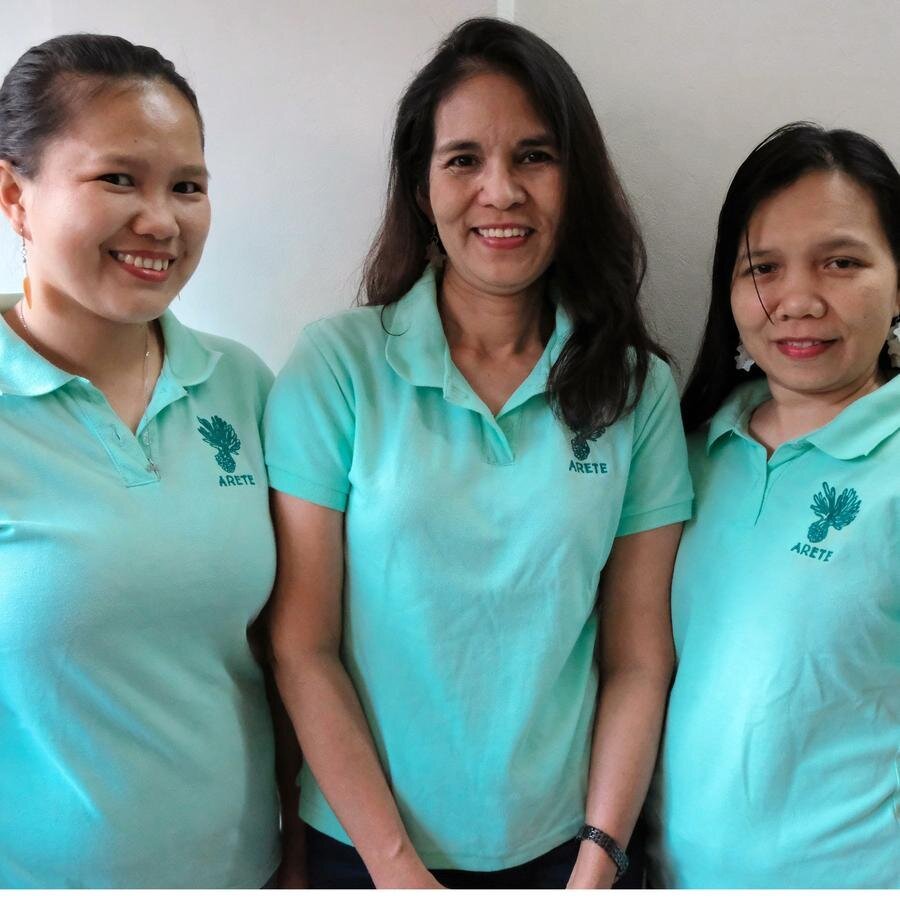
Arete works primarily with housewives and teen mums in Manila, Cebu & Bacolod. Image credits: Arete
When did you realise that Pag-asa was making an impact on the lives of your artisans?
E: Mid 2020 was probably a moment that stands out for me. COVID-19 had spread further and quicker than we ever imagined and we were really seeing the impact it was having on people around the world. Although we were also struggling with the pandemic here in New Zealand, it wasn’t nearly as bad as what other countries were dealing with. So I really felt like I needed to do my best to try and continue supporting them during this time.
During this time, I reached out to our partner projects to see how they were going – and that’s when I really saw what a difference Pag-asa could make.
For instance, Mia, who started Arete, was able to continue giving her artisans an allowance when Manila went into lockdown as they weren’t able to work. It was good knowing that thoughtful purchases from Pag-asa were helping take care of the artisans.
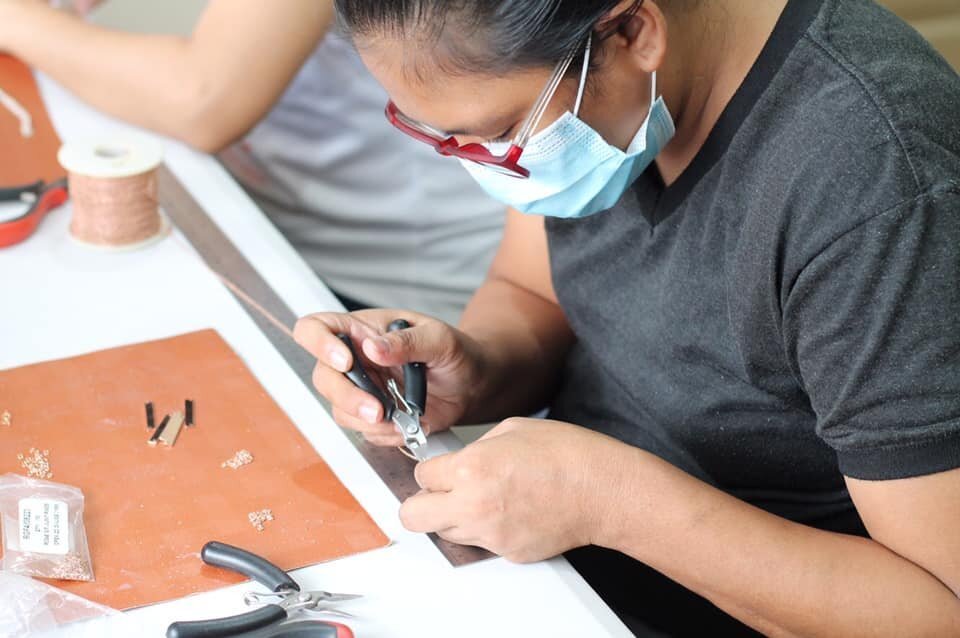
Tayo Collective employs artisans that have been saved from human trafficking in the Philippines. Image credits: Tayo Collective
How can ethical consumption make a difference to survivors of human trafficking?
E: It provides survivors with an outlet to start again. It gives them hope and allows them to continue to provide for their families in a safe space where they are treated with respect and love while feeling worthy and empowered.
What’s your favourite collection/item right now?
E: That’s a hard one! I handpick every item from each partner project so really, they’re all my favourite but I’ll pick just one item from every collection.
Firstly Arete, my favourite has to be the Flores mini. It has traditional Filipino elements while still remaining modern and simple.
Next from Tayo Collective, the Talitha necklace which I like to wear most days. It’s such a stunningly simple piece that goes with pretty much anything! But most importantly, it’s a piece I’m proud to wear because it reminds me of the women who make it and why I do what I do.
From En Route Handcrafted, it has to be the Sinulog Clutch. Made by women inmates from Davao City jail, it holds a message of hope.
Lastly from ANTHILL, who are our only non-jewellery business, is the Navy Stripe Slim Necktie. These are handwoven using traditional techniques and this specific tie is made by artisans that live in the same province where my mother was born – how cool is that?!
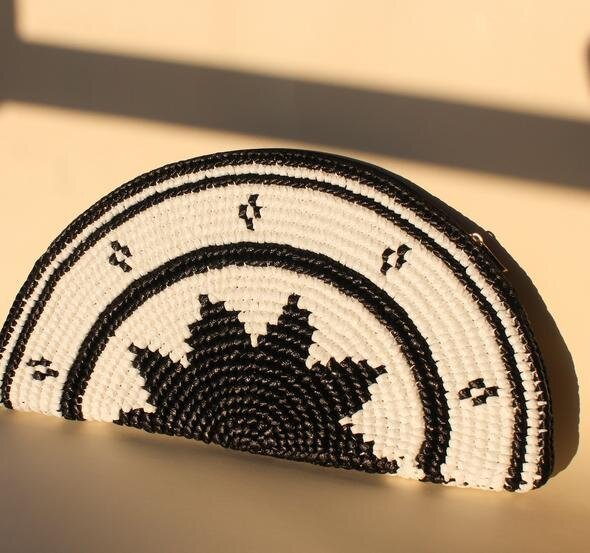
The Sinulog Clutch made by women inmates from Davao City jail. Image credits: En Route Handcrafted,
Myint Aung, Reca
Myint Aung grew up in Myanmar where she encountered harmful stereotypes of how women should portray themselves. Luckily she was surrounded by strong women who encouraged her to seek independence and to stick up for herself.
After she moved to New Zealand, Myint was inspired by the wide range of opportunities presented to Kiwi women. She always knew she was going to start a business and was a fashion-lover, but she was also aware of how unethical the industry was.
Instead of adding to the problem, she dediced to be part of the solution. So she created Reca in hopes of empowering women around the world through employment, creativity and independence.
What goes into crafting ethical jewellery?
M: For our products, we make sure that our materials suppliers pay a living wage and provide good working conditions. For the suppliers we buy finished products from, we want to make sure they meet the same conditions.
The ethical aspect, for us, is just the beginning. We make sure we’re sourcing ethical products, sure. But more importantly, we want to make sure that the products we source are meaningfully changing someone’s life, somewhere in the supply chain, in the most amazing way possible. We make sure all of our products have done something life changing for a woman, somewhere in the world.
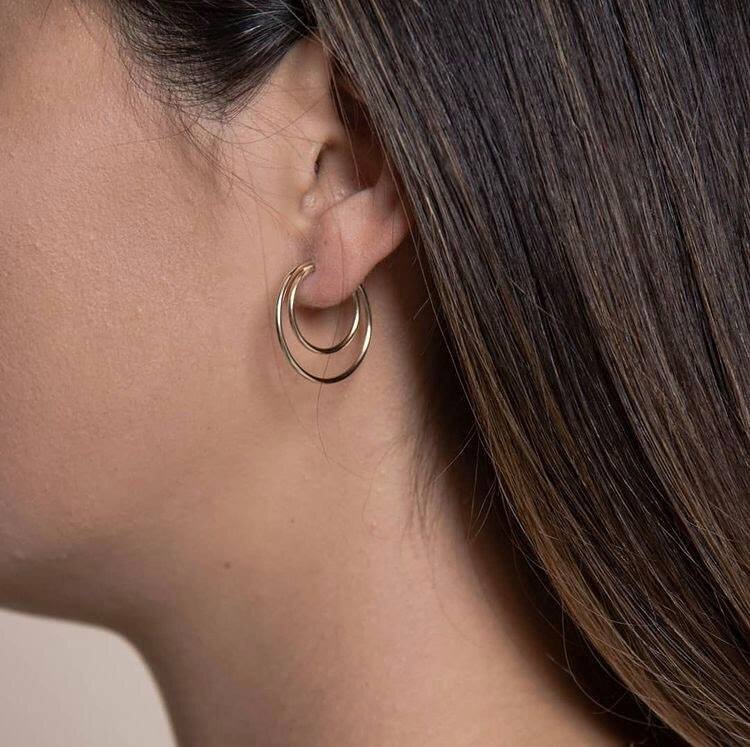
“We make sure all of our products have done something life changing for a woman, somewhere in the world.” Image credits: Reca
At fair&good, we love connecting our community to the people who make their products. Could you tell us about your team of artisans?
M: Locally we’re a really small team of two. Coming from a refugee background myself, we know a lot of former refugee women in Auckland who need opportunities, and we really want to build support for them as we grow.
From Cambodia we source products from Penh Lenh, a Non-Government Organisation who’s mission it is to support disadvantaged women. Cambodia has had a very troubled history and a little support goes a long way.
From the Phillippines, we source products from the Tayo Collective, which is a relatively small group who rescue women from bars, where they’re forced into working. The foundation gives them a safe space to hide (literally) and they’re given scholarships to schooling, help with legal documentation, and training on things like jewellery making and soap making.
The money they make from jewellery making is a really important part of their living support – at this time in their lives they have very little money. The women are paid a living wage to support their families. It’s interesting that a lot of locals and foreigners don’t realise that these women are sold, trafficked and exploited, and not working of their own free will.
We also have a strong connection with the Suwannimit Foundation in Thailand. The foundation operates in a small border town with Myanmar, called Mae Sot, which is notorious for human trafficking, black markets and the drug trade.
The foundation does absolutely amazing work for disadvantaged migrants from Myanmar who need healthcare and education. While we don’t buy products from them yet, we’ve been in discussions about travelling there to train women on how to make our products, to support them into independence with a living wage and other support. Before we can do this, we need our brand to grow and wait for border restrictions from Covid-19 to ease.
Our ultimate goal is to copy their foundation model to my home town in Myanmar, but we have a lot of work to do first!
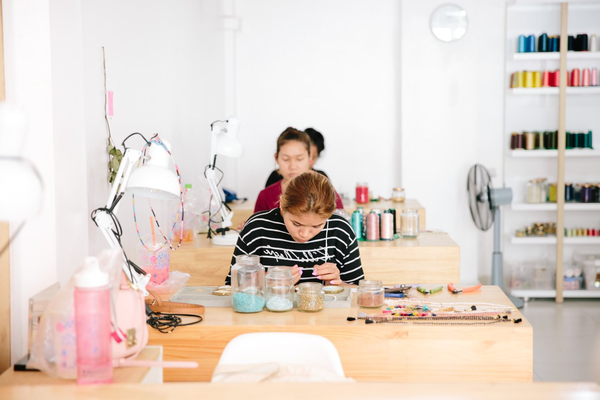
Reca works with artisans from Penh Lenh, a Non-Government Organisation who’s mission it is to support disadvantaged women. Image credits: Penh Lenh
When did you realise that Reca was making an impact on the lives of your artisans?
M: From day one, our mission has been to make an impact on their lives, so we would never have started doing what we do if it didn’t have an impact. However, travelling to places like the Philippines and talking with the artisans, hearing their stories and knowing that their lives have improved has been really eye-opening.
How can ethical consumption make a difference to survivors of human trafficking?
M: With Reca’s products, we like to think that each item has changed someone’s life for the better. For ethical products in general, it goes back to the cycle of desperation I spoke about before.
Buying an ethical product doesn’t necessarily mean that you’re changing someone’s life in that moment, but consistently buying ethical products means you’re breaking that cycle of desperation. You’re helping thousands of people live better lives, and reducing the risk of women being forced into situations that you could never dream of being in.
What’s your favourite collection/item right now?
M: My all time favourite piece is the Curved Gold Bar Necklace, which happens to be a customer favourite too. I also really love the Long and Short Chain Choker.
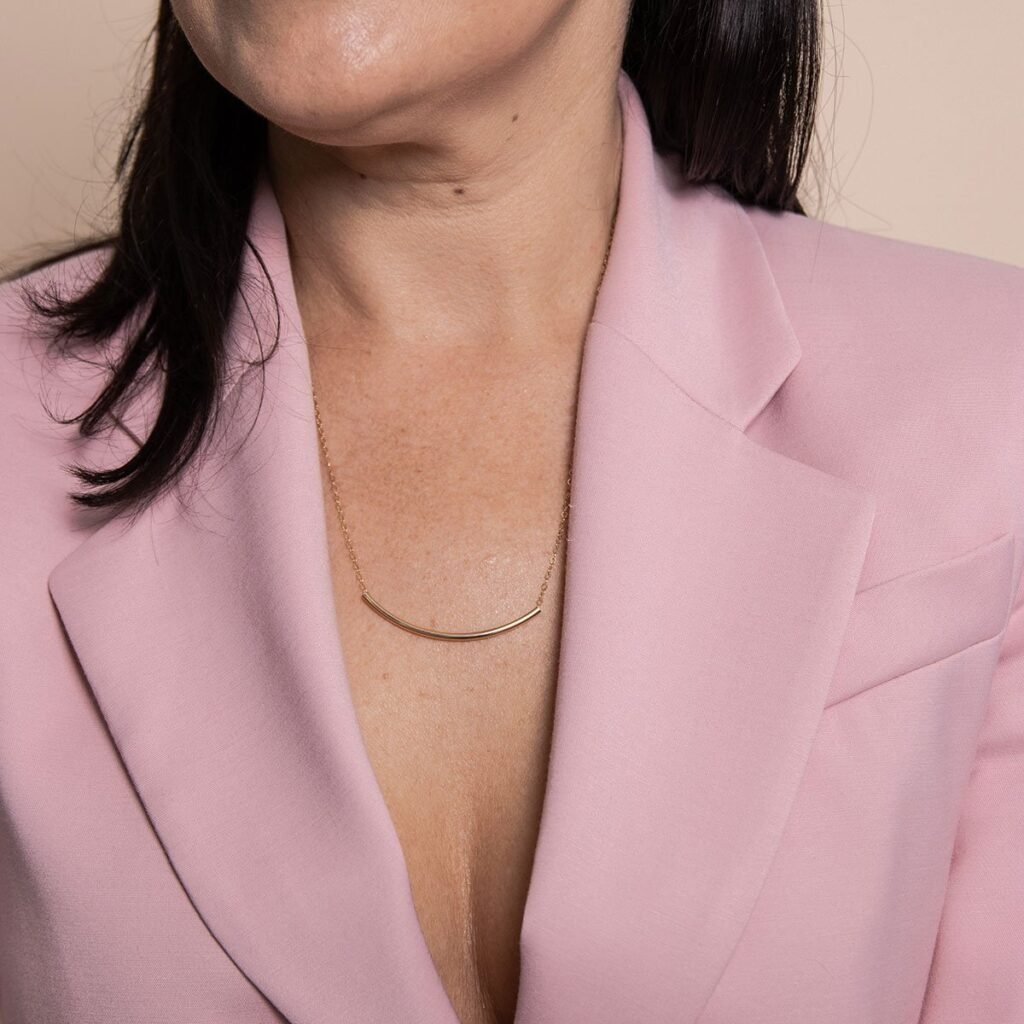
The Curved Gold Bar Necklace by Tayo Collective. Image credits: Reca
Looking for accessories that make a difference?
Whether you’re after a special heirloom or a statement piece, Pag-asa Collective and Reca help you wear your values with style.
Every piece tells a story and 100% of their profits go towards helping women and survivors of trafficking reclaim their power.

